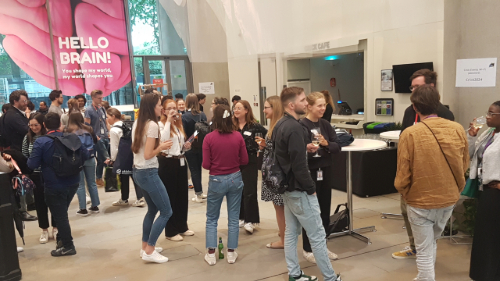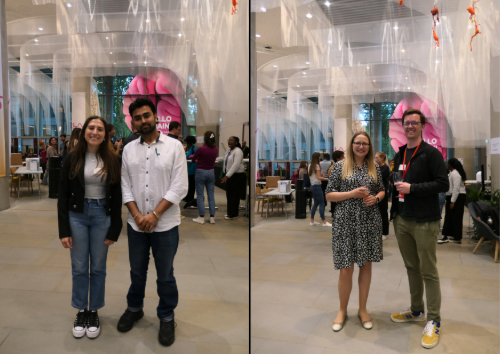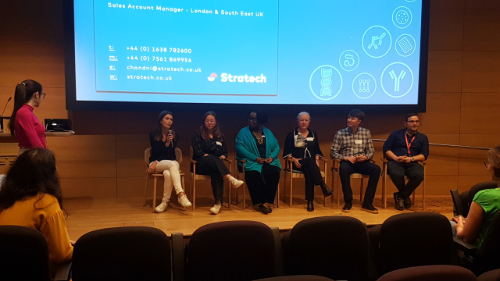A new annual infection biology symposium for ECRs to add to the calendar!
The London Infection Postdoc Network (LIPN) is a collaborative platform founded in 2021 by postdoc representatives from several London-based research institutions working in infection biology [(The Francis Crick Institute, Imperial College London (ICL), London School of Hygiene and Tropical Medicine (LSHTM), Queen Mary University, Birkbeck and University College London (UCL)]. The COVID-19 pandemic had a significant impact on scientific and social exchange in the London research community, especially affecting postdocs given the often temporary and itinerant nature of their jobs. This motivated us to form the LIPN to organise events and create virtual spaces to allow ECRs to present their research to a like-minded audience. From the start, LIPN organised bi-monthly seminars that helped to expand networks, support career development and create a safe space for ECRs to discuss career or technical issues.
Organising our first symposium last year had been challenging but an amazing learning experience. Encouraged by the positive feedback we received after the event, we re-applied for a Crick Partnership Networking Fund with the aim to organise a second symposium by and for ECRs in London and to incorporate comments and suggestions by previous attendees. Our application, which highlighted the steps we had taken to increase our reach and provide more support to ECRs, was successful, and so our second symposium became a reality. To make the event free of charge and accessible to everyone interested, we additionally secured a Microbiology Society conference grant and funding from numerous industry sponsors (2B scientific, Avantor, Cytiva, Integra, New England Biolabs, PCR Biosystems, UKbiocentre Stratech, Cell Signalling Technology and Thistle Scientific).

The overall programme was similar to that of the first LIPN symposium. In response to our attendees’ feedback, we allocated more time for the careers panel discussion, included flash-talks for selected posters to encourage exchange during the poster sessions and offered child support grants to participants. We have also endeavoured part of our efforts in putting together easy to digest flyers about mental health support and mental health first aiders in our various institutions (downloadable from our website and here), and we also included an exhibition stall for this purpose. Finally, in response to last year’s feedback from sponsors, we set up a “sponsor-bingo” to increase interactions at their exposition stalls. The completed bingo card would enter a raffle with three prize packs donated by our sponsors (including plushies, Lego AKTAs and Thermos). Our sponsors all agreed it increased significantly their exposure and interaction, and our attendees really enjoyed the game, hence we will keep the bingo going forward.
Our symposium attracted around 120 ECRs from across London, Cambridge and Oxford, giving us the opportunity to increase networking. The prizes for the best talk and best poster were awarded, based on an audience vote, to Dr Ines Diaz del Olmo (ICL) and Dr Vishwas Mishra (ICL) respectively (abstract book). Ines presented her latest work on non-canonical transcriptional reprogramming during Salmonella Typhimurium infection orchestrated by the type III secretion system effector SteE. Vishwas’ poster was focussed on modulating our immune responses to limit hyper-inflammation, specifically targeting the pro-inflammatory cytokine IL-1β (manuscript available).

The Microbiology Society conference grant allowed us to invite two excellent speakers: Dr Ashley Otter from the UK Health Security Agency (UKSHA) and Professor Jessica Blair from the University of Birmingham. Dr Ashley Otter kick-started the day with an exciting talk about how UKHSA tackles emerging pathogens, from SARS-CoV2 to Mpox, giving us insights into his career and his vision for future pandemic preparedness. Professor Jessica Blair rounded up the symposium with a molecular biology take on pathogens and the mechanisms involved in antimicrobial resistance (AMR), the other main concern for those working in infection biology and a so-called silent pandemic in its own right.
One of the most praised sessions in our first symposium was the careers discussion panel, featuring representatives from various career tracks within and outside of academia, giving our audience the opportunity to discuss different career paths. This year’s panel members were: Vincenzo Torraca (PI at King’s College London), Michela Mazzon (set up start-up Virology Research Services), Catherine Kibirige (research manager at Imperial College London and set up start-up HIVquant), Ben Johnson (senior editor at Nature Medicine), Caitlin Davies (analyst at LifeArc) and Alycia Draper (senior policy advisor at Wellcome). Thanks to their openness about their careers and their motivations, we got insights into the pros and cons of their jobs.

We obtained very positive feedback from attendees, sponsors, speakers and participants both on the day and in our online post-event survey. While we have improved in terms of equality, inclusion and diversity, we still want to do more in this aspect, especially in encouraging participation from minorities. Furthermore, we will also include a presentation slot in our programme for mental health, as we believe it is a major topic that needs tackling in research culture.
This second annual symposium once again showed it deserves its slot in the science symposium calendar, establishing a legacy. Our work as the LIPN committee would not be possible if we were not a solid team, happy to commit some of our time in discussing and planning the events, sharing tasks and putting extra effort and enthusiasm into maintaining and growing this network. Within the last year, we have successfully expanded to other institutions and started tackling crucial non-research-related topics affecting ECRs such as mental health and career development). We hope to continue our journey to making the ECR infection community more welcoming, rewarding and inclusive in the years to come. If you would like to know more about who we are, please visit our website, and if you want to know about our events or join the organising team, please join/contact us on our mailing list; or follow us on twitter @LondonPostdoc.
